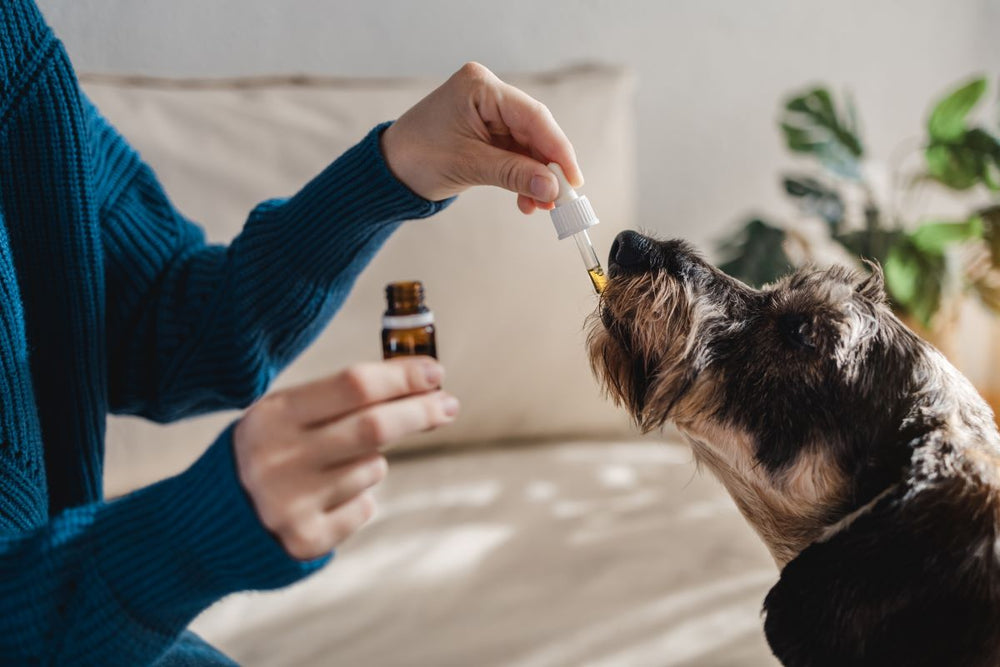By: Kayla Kowalski, Certified Canine Nutritionist
Vitamin E is rightfully celebrated for its benefits to skin and coat health, but did you know about its lesser-known superpower as an antioxidant? It sweeps through the body, neutralizing damaging free radicals that cause inflammation and illness. When our pups are sick, their bodies increase oxidation and free radical production, making the antioxidants from vitamin E even more helpful in keeping our dogs healthy and happy.
Let's dive into the world of vitamin E: we'll discuss how it can elevate your dog's health and how you can seamlessly incorporate it into their diet.

Is Vitamin E Good for Dogs?
Alongside reducing oxidative stress and free radical damage to tissues, vitamin E is known for its role in forming cell membranes. It also supports many other body functions, making it an essential vitamin.
Vitamin E Helps Strengthen Your Pup's Immune System
Vitamin E has been proven to play a vital role in the immune system's ability to respond to threats and keep the body healthy. Low levels of vitamin E may weaken the immune system, making the body less prepared to combat immune threats.
Vitamin E Promotes Healthy Skin and Coat
Low levels of vitamin E have been correlated with itchy skin. Supplementing this vitamin can help keep your dog’s skin healthy and soothe any itch or nasty skin infections. Vitamin E oil can be applied as a topical solution for dogs suffering from skin diseases; just make sure your furry friend does not lick off the oil. Of course, always consult your veterinarian before adding new supplements to your pup's health regimen.
Vitamin E Can Help Treat Liver Disease
Vitamin E is a fat-soluble vitamin that is stored in the liver. Thus, if liver function is impaired, vitamin E may not be stored and utilized effectively. In these cases, supplementing with additional vitamin E can help support your pup's body, giving the liver a better chance to heal.
When to Add a Vitamin E Supplement to Your Pup's Diet
Most dogs get enough vitamin E through a nutritionally-balanced diet, so deficiencies in this vitamin are rare. However, some breeds, such as English Cocker Spaniels, are predisposed to vitamin E deficiencies. Additionally, during times of stress or illness, your pup may benefit from a vitamin E boost. Your veterinarian can advise you on the amount of vitamin E your fur baby needs based on their diet, health status, and breed.
Vitamin E supplementation may be recommended for dogs with:
- Unbalanced diets.
- Anxiety or illness.
- Underlying health concerns.
- An inherited vitamin E deficiency.
Signs of a Vitamin E Deficiency in Dogs
As we discussed, true vitamin E deficiencies in dogs are rare. If you are concerned that your pup may have a vitamin E deficiency, look for the following signs:
- Poor vision
- Neurological symptoms such as muscle weakness or paralysis
- Reproductive dysfunction
- Weakened immune system
Contact your veterinarian immediately if you notice your dog exhibiting the above signs. They will recommend tests, medications, and treatment plans based on your pup's unique case.

How to Boost Your Pup’s Vitamin E Intake
Add Vitamin E-Rich Foods to Your Dog's Diet
We can naturally boost our dog's vitamin E intake (alongside other essential vitamins and minerals) by including a range of fresh, healthy foods in their diets.
Natural sources of vitamin E include:
- Fish such as salmon or rainbow trout
- Plant oils such as safflower, wheat germ, or sunflower oil
- Nuts and seeds such as almonds, peanuts, or sunflower seeds
- Vegetables such as spinach or broccoli
Vitamin E Supplements for Dogs
For dogs needing an extra vitamin E boost during times of stress, illness, or deficiency, supplements are a great option to get in all the good stuff. Vitamin E is present in eight different forms. Of these, alpha-tocopherol is the easiest form of vitamin E for your pup to absorb and utilize.
Our Omega Oil combines wheat germ oil and salmon oil for a powerful source of vitamin E alongside the omega-3 fatty acids and fish oil benefits for skin, coat, and joints.

How Much Vitamin E Does My Dog Need?
Since vitamin E requirements are generally met through your pup's diet, individual needs depend on what your dog is being fed. All commercial dog foods must meet standards set by the Association of American Feed Control Officials (AAFCO). Therefore, feeding your pup a pet food labeled “complete and balanced” should provide them with all the vitamin E they need.
If you are feeding your dog a homemade diet, focus on foods high in vitamin E (such as those listed above) and consider supplementation. Working with a certified canine nutritionist is highly valuable if you're new to homemade diets (or need help getting the balance right).
Potential Side Effects of Vitamin E in Dogs
While vitamin E overdose is rare, too much of the vitamin can result in accumulation within the liver. Potential side effects to monitor for include:
- Increased bleeding or issues with blood clotting
- Vomiting
- Diarrhea
- Shaking or nervousness
The Bottom Line on Vitamin E for Dogs
Vitamin E is an antioxidant powerhouse that keeps your dog’s body happy, healthy, and thriving. Its importance may be overlooked as requirements are generally met through your dog's diet. However, if you're feeding a homemade diet or your dog is experiencing some health concerns, supplementation may be necessary to get that spring back in their step.

For more information or advice on vitamins, minerals, and all things canine nutrition, visit KaylaKowalski.com. As a certified canine nutritionist, I have created over 4,500 customized diet plans for pets around the world. Whether you want to dip a paw in adding fresh food toppers to your dog's kibble or transition to a balanced, fully raw diet, I'm here to help you.
For more tips on feeding your dog vitamins or adding supplements to their diets, check out the Native Pet blog.


